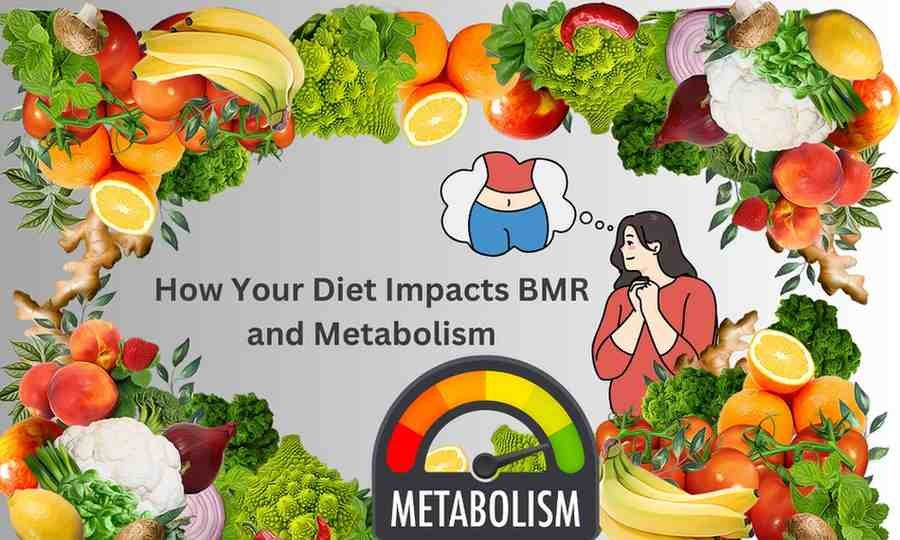How Your Diet Impacts BMR and Metabolism

Understanding BMR and Metabolism in the Context of Management .What you eat and drink has a direct connection to managing these two functions. This has an impact on calorie expenditure at rest or during activity, but how exactly does your diet affect BMR and metabolism, and what does this play into achieving your fitness goals? Let’s take a closer look at how nutrition impacts your two critical mechanisms.
What Is BMR and Why Does It Matter?
What is BMR? Your BMR is the number of calories your body requires to simply maintain fundamental functions – like breathing, circulation, and cellular repair – at rest. It’s the absolute minimum amount of energy your body needs to get by.
If you want to determine your personal calorie needs, one good starting point will be through a BMR calculator or basal metabolic rate calculator. This can give an estimate of the calories you burn merely by resting. From there, you may modify your food intake to achieve weight loss, gain, or maintenance goals.
How Does Your Diet Relate to BMR?
While genetics and age do have a role in your BMR, diet is an important factor too. Now see how your food choices affect your basal metabolic rate and metabolism:
-
Protein Intake Boosts Metabolism:
The high-protein diet involves more energy in digestion. That is why it increases your BMR. This is referred to as TEF-the difference in calorie expenditure when processing protein, fat, or carbohydrates. In this case, there should be a high-protein diet included in the BMR calculator to achieve the ideal reduction in weight.
-
Calorie Deficit and Slow Metabolism:
Crash dieting to lose weight has an unanticipated side effect: cutting too many calories slows your BMR. Your body then goes into “starvation mode,” conserving whatever it can instead of expending its normal amount of energy. To avoid the trap of setting your calorie intake at too low a level, you may use a TDEE calculator, for example, to determine the recommended daily calorie intake based on the level of your activity.
-
Good Fats Promote Hormone Balance:
Your metabolism is heavily reliant on hormones. Healthy fat sources, like omega-3s, maintain hormonal function that can help support basal metabolism.
BMR and TDEE Calculators: Monitoring Progress
Where a BMR calculator would tell you how much energy your body burns at rest, to get the full picture about how much energy you burn daily, you would need to use a TDEE calculator. More precisely, in planning a diet, a TDEE factor is used to take into account your activity level.
- How to calculate BMR: You may either employ free online BMR calculators or use math formulas like Harris-Benedict or Mifflin-St Jeor equations.
- TDEE vs. BMR: Difference BMR determines the calories that will be used to sustain life, while TDEE encompasses such activities as exercise, walking, and even digestion.
Balancing Diet and Metabolism to Lose Weight
When you intend to lose weight, you have to get it right. Calculating BMR is only half the answer; you have to modify your intake according to your TDEE. To give you a head start, here are some guidelines:
- Eat Balanced Meals: At the meals, include proteins, healthy fats, and complex carbohydrates so that your energy levels are maintained.
- Track Your Calories: Calculate the calories of what you consume with help from the basal metabolic rate BMR calculator. Use it to determine how many calories you burn per rest day and plan your meals accordingly.
- Avoid Crash Diets: Starving yourself can make your BMR decrease, and it gets tougher to lose weight over time.
Categories
Latest Posts
- The Evolution of GST Calculators: From Manual to Online Tools
- 10 Mistakes to Avoid While Using an EMI Calculator
- Top Benefits of Using an Online EMI Calculator for Financial Planning
- 5 Common Mistakes to Avoid When Using an EMI Calculator
- How to Use an EMI Calculator to Plan Prepayments and Reduce Your Loan Tenure
- The Future of EMI Calculators: AI-Powered Features to Expect in Fintech Tools

